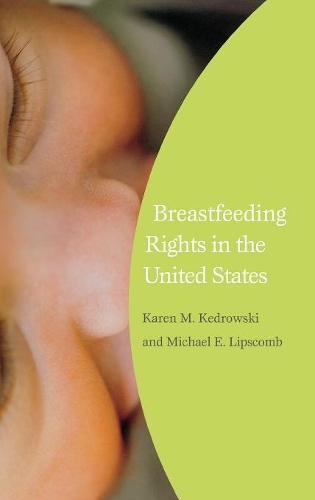
Breastfeeding Rights in the United States
(Hardback)
Publishing Details
Breastfeeding Rights in the United States
By (Author) Karen M. Kedrowski
By (author) Michael E. Lipscomb
Bloomsbury Publishing PLC
Praeger Publishers Inc
30th December 2007
United States
Classifications
General
Non Fiction
613.269
Physical Properties
Hardback
192
Width 156mm, Height 235mm
454g
Description
Breastfeeding Rights in the United States shows that the right to breastfeed in this country exists only in a negative sense: you can do it unless someone takes you to court. Kedrowski and Lipscomb catalog and analyze all the laws, policies, judicial opinions, cultural mores, and public attitudes that bear on breastfeeding in America. They then explore the classic double bind: social norms promulgated by the medical and public health establishment say breast is best; but social practices in the workplace and in public spaces make breastfeeding difficult. Aggravating the double bind is the prominence of the breast in American culture as a sexual object. The double bind creates coercively structured choices that are incompatible with the meaningful exercise of rights. The authors conclude that the solution to this problem requires new theory and new strategy. They posit a new democratic, feminist theory of the breastfeeding right that is predicated on the following distinctions: DT It is not a right to breastfeed, but a right to choose to breastfeed. DT It is a woman's right to choose, not a baby's right to be breastfeed. DT It is a right, not a duty. The authors predict that framing the breastfeeding right in this way provides the basis for a new strategic coalition between breastfeeding advocates and liberal feminists, who have historically been wary of one another's rhetoric. Breastfeeding Rights in the United States represents an important advance toward policy change.
Reviews
Although there has been a growing interest recently in the body as a major influence on social theorizing, these perspectives are supplanted in this analysis of breastfeeding as a civil rights issue both by a model of social construction and by the traditional approach of political scientists. Hence the organization of this analysis reflects a conventional focus on history, public opinion, and state as well as national laws, and a concluding chapter touted as democratic feminist.Recommended. General readers and students of all levels. * Choice *
Author Bio
Karen M. Kedrowski is professor and chair of the department of political science at Winthrop University. Her research and teaching areas include media and politics, women and politics, American politics, and public policy. She is the author of Media Entrepreneurs and the Media Enterprise in the US Congress and co-author of Cancer Activism: Gender, Media, and Public Policy. Her articles have appeared in Armed Forces and Society, Journal of Political Science, Perspectives on Politics, Political Communication, PS, and Teachers College Record. Michael E. Lipscomb is associate professor of political science at Winthrop University, where he teaches political theory and American politics. His work in critical theory, postmodern political theory, and environmental politics has appeared in New German Critique and Administrative Theory and Praxis.
